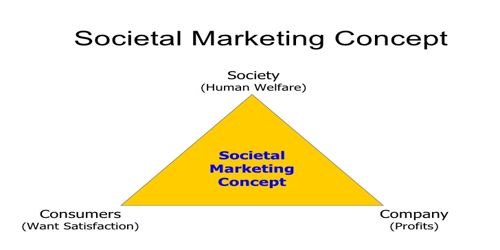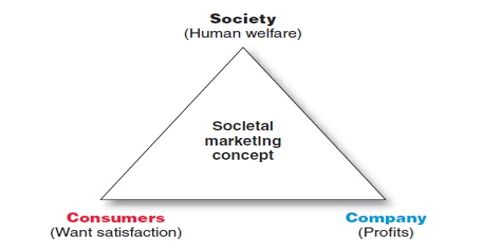Societal marketing concept
The societal marketing concept is an enlightened marketing concept that holds that a company should make good marketing decisions by considering consumers’ wants, the company’s requirements, and society’s long-term interests. It is closely linked with the principles of corporate social responsibility and of sustainable development. Early papers on the topic include those by William Lazer and by Philip Kotler and Sidney Levy. The Journal of Marketing presented a comprehensive discussion of societal marketing in July, 1971.
The societal marketing holds that the organization should determine the needs, wants, and interests of target markets. It should then deliver superior value to customers in a way that maintains or improves the consumer’s and the society’s well being. The societal marketing concept is the newest of the five marketing management philosophies.
The societal marketing concept questions whether the pure marketing concept is adequate in an age of environmental problems, and neglected social services. It asks if the firm that sense, serves and satisfies individual wants is always doing what’s best for consumers and society in the long run.
According to the societal marketing concept, the pure marketing concept overlooks possible conflicts between consumer short run wants and consumer long run welfare. Consider the fast food industry. Most people see today’s giant fast food chains as offering tasty and convenient food at reasonable prices. Yet many consumer and environmental groups have voiced concerns. Critics point out that hamburger, fried chicken, French fries and most other foods sold by fast food restaurants are high in fat and salt. The products are wrapped in convenient packaging, but this leads to waste and pollution.

Definition
The societal marketing concept holds that the organization’s task is to determine the needs, wants, and interests of a target market and to deliver the desired satisfactions more effectively and efficiently than competitors in a way that preserves or enhances the consumer’s and the society’s well-being.
Therefore, marketers must endeavour to satisfy the needs and wants of their target markets in ways that preserve and enhance the well-being of consumers and society as a whole. The concept has an emphasis on social responsibility and suggests that for a company to only focus on exchange relationship with customers might not be suitable in order to sustain long term success. Rather, marketing strategy should deliver value to customers in a way that maintains or improves both the consumer’s and the society’s well-being.
Various attempts to define the objectives of societal marketing have been noted, such as :
- “Social responsibility implies that a business decision maker… is obliged to take actions that also protect and enhance society’s interests.
- “Business has the responsibility to help [the consumer] …. It is the duty of business to promote proper consumption values.
- “Business leaders are mandated to adopt roles of leadership in the advancement of our society to new levels of moral conduct.
History
The concept of Societal Marketing emerged in 1972, promoting a more socially responsible, moral and ethical model of marketing, countering the consumerism way of thinking that had been promoted by then.
It was introduced in an article by Philip Kotler, “What consumerism means for marketers” in the Harvard Business Review Journal. The social and societal concerns had existed by then, but it was not that they became incorporated explicitly in the marketing literature.
Kotler introduced in that period both the concept of Social marketing (extending marketing technologies into non-business areas) and societal marketing, arguing that the marketing concept and its technologies must be tempered and ultimately revised by adopting a more explicit social orientation.
Kotler’s novelty to the marketing concept was the idea of “long-run consumer welfare”, emphasizing that the short-term desires might not support the consumer’s long term interests or be good for the society as a whole.
Instruments
Kotler identified four categories of products, classified in terms of long term benefits and immediate satisfaction :
- Deficient products, which bring neither long-run or short term benefits
- Pleasing products, which bring a high level of immediate satisfaction, but can cause harm to the society in the long run
- Salutary products, which bring low short term satisfaction, but benefit the society on the long run
- Desirable products, which combine long-run benefit and immediate satisfaction
Kotler’s concept of societal marketing suggested that for the well-being of society, the deficient products should be eliminated from the market, pleasing and salutary products should go through a product modification process to reach the fourth category, by incorporating missing short term benefits into salutary products and long term benefits into pleasing products, and the companies’ ultimate goal should be to develop desirable products.
This way, rather than focusing on selling a products, which can be good or bad for the consumers, the main focus is on consumer and society well-being.
Examples of societal marketing
Most companies recognize that socially responsible activities improve their image among customers, stockholders, the financial community, and other relevant publics. Ethical and socially responsible practices are simply good business, resulting not only in favorable image, but ultimately in increased sales.
1) The Body Shop: The Body Shop International plc is the original, natural and ethical beauty brand. The company uses only plant based materials for its products. It is against Animal testing, supports community trade, activate Self Esteem, Defend Human Rights, and overall protection of the planet. They have also their own charity, The Body Shop Foundation, to assist those working to achieve progress in the areas of human and civil rights, environmental and animal protection. Thus Body shop is really following the concept of Societal Marketing.
2) AVON Product inc. has started an initiative known as Avon breast cancer awareness crusade in 1993 in partnership with National Alliance of breast cancer Foundation (NABCO).They started selling pink ribbon pins which depicts the international symbol for breast cancer for$ 2 and donates $1 to NABCO. Through the crusade Avon sale representatives have raised billion of dollars for breast cancer education and access to early detection services for underserved woman. In addition, Avon’s 45000000 US sales people have been trained to discuss breast cancer and importance of early detection with their customers and distributed 80 million flyers on breast cancer detection.
Future development of the concept
Societal marketing is gaining the marketers and consumer attention and there is every reason to expect it to continue to evolve in practice. It focuses on providing win-win opportunities to companies, consumers and society. But achieving the compelling benefits for each party involved is very complicated. So much more research is needed. To achieve a win situation for organization involved, is dependent largely upon how the key constituents react. In this context, anticipating consumer reaction is really challenging which can be affected by number of factors that often vary across different segments. The several research questions remain to be answered like how different factors affects reaction to societal marketing and how do the various factors interact? How can societal initiatives be designed to leverage positive reaction and mitigate negative ones?
For consumers to win, societal marketing must provide them with compelling benefits that increase their overall welfare. What benefits did societal marketing initiative actually provided to consumers? Are there direct benefits such as increased satisfaction with their interaction with commercial or nonprofit organization? Determining whether there is a win situation for society by societal marketing initiative is the most difficult question to be answered. We turn to the two questions proposed by Bloom, Hussien and Szykmann (1995) : Is the society better off because of this program? Does corporate involvement result in better performance than if it would have been managed by NGOs or government agencies? Societal marketing is becoming globally popular but there exist a scarcity of research in this field. Therefore extensive future research is needed particularly investigating questions with respect to its impact on consumer attitudes to corporate image, product image and their purchase intention or brand choice as well as on positive impact on society.
Information Source:
















